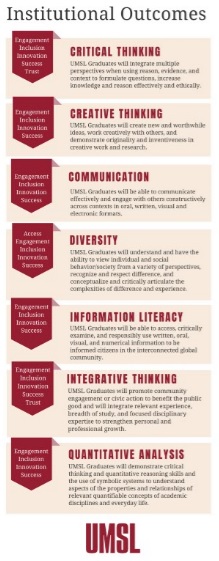UMSL’s fundamental purpose is to educate and graduate diverse students as they seek different and better lives. Through our collective efforts, we are committed to the following institutional outcomes for all graduates that are grounded in our core values of trust, inclusion, innovation, access, success and engagement. We strive to provide a transformative educational experience that empowers students to become critical thinkers, effective communicators, and engaged citizens who are prepared to make a positive impact on the world.
Institutional Outcomes
Critical Thinking
Engagement, Inclusion, Innovation, Success, Trust
UMSL Graduates will integrate multiple perspectives when using reason, evidence, and context to formulate questions, increase knowledge and reason effectively and ethically.
Creative Thinking
Engagement, Inclusion, Innovation, Success
UMSL Graduates will create new and worthwhile ideas, work creatively with others, and demonstrate originality and inventiveness in creative work and research.
Communication
Engagement, Inclusion, Innovation, Success
UMSL Graduates will be able to communicate effectively and engage with others constructively across contexts in oral, written, visual and electronic formats.
Diversity
Access, Engagement, Inclusion, Innovation, Success
UMSL Graduates will understand and have the ability to view individual and social behavior/society from a variety of perspectives, recognize and respect difference, and conceptualize and critically articulate the complexities of difference and experience.
Information Literacy
Engagement, Inclusion, Innovation, Success
UMSL Graduates will be able to access, critically examine, and responsibly use written, oral, visual, and numerical information to be informed citizens in the interconnected global community.
Integrative Thinking
Engagement, Inclusion, Innovation, Success, Trust
UMSL Graduates will promote community engagement or civic action to benefit the public good and integrate relevant experience, breadth of study, and focused disciplinary expertise to strengthen personal and professional growth.
Quantitative Analysis
Engagement, Inclusion, Innovation, Success
UMSL Graduates will demonstrate critical thinking and quantitative reasoning skills and the use of symbolic systems to understand aspects of the properties and relationships of relevant quantifiable concepts of academic disciplines and everyday life.

